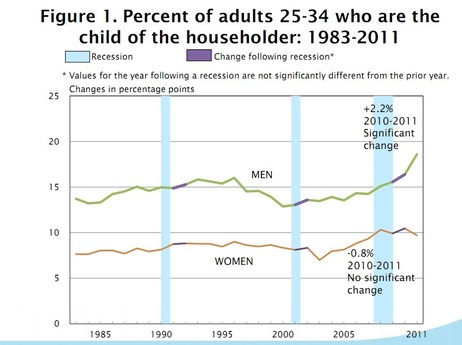Where have the young adults gone?
Without a doubt many young adults, those between the ages of 25 to 34 have moved back home (or never left home) because of the recession:
Source: Census
Part of the trend is unmistakable in that much of the growth has come from men. This is likely due to industries like construction taking a brutal hit once the housing market went bust. However the trend has also occurred with females if we go back to the early 2000s. There are a variety of reasons for this compression of generations. This is common in other parts of the world but certainly is a new phenomenon here in the US. In Italy it is common for men to live at home well into (and beyond) young adulthood but how well will this go in the US?
It doesn’t seem like much of this is by voluntary choice:
“(TIME) Nearly 25 million adults live at home with their parents because they’re unemployed or underemployed, they’re trying to pay off student loans or save money to buy a place, or for any number of other reasons. While calling mom and dad your “roommates” may be a smart financial move, it’s the kiss of death for a healthy dating life. Trulia’s survey found that only 5% of unmarried adults would be open to dating someone who lived with their parents.”
This might also explain a massive slowdown in the first time homebuyer market since many purchase their first home between the ages of 25 to 34. It is tricky to purchase a home when people are working low-wage jobs or simply not working at all. The massive amount ofstudent debt also hangs above many from moving into another major debt purchase. As the above data highlights living with your parents might be good for your pocketbook but it might be difficult to woo a potential partner when living at home for many reasons. Yet this also delays the need for a home since there is little need for larger spaces when you are single. Without a doubt the trend of young adults living at home has increased:
